Hi again everyone! Slow but surely I’m recovering from my first (of two!) total knee replacement surgeries. I’m at just over two weeks post-op and have made a lot of progress. I’m still limping around and the pain and stiffness remains annoyingly persistent, but I can work a bit more more now. I just can’t bike yet so my ability to get stories is limited to what I can do online. I’m hoping by start of June I can bike around and attend more events. We’ll see.
For now, here are the most notable stories that came across my desk in the past week…
Carfree downtown is key: Nice to see someone from outside the transportation reform sphere make a clear argument for more carfree spaces in downtown Portland. This time it’s noted architecture critic Brian Libby. (Business Tribune)
More than free breakfast: Portland’s fun Breakfast on the Bridges tradition got the major props it so richly deserves! (NPR)
Punishment and crime: The British Parliament is considering an update to their criminal law that would add a new penalty of life in prison for cyclists who kill someone while riding. (BBC)
Duffy is wrong: Not that it matters because the Trump Administration doesn’t care about facts; but just for the record, our current USDOT Secretary Sean Duffy has no clue what he is talking about when it comes to bike lanes (and just about everything else) . (Streetsblog USA)
Road rage assault: A cycling advocate in Chicago called out a driver for parking in a bike lane and a passenger in the car hopped out and whacked the advocate over the head with a crow bar. (Streetsblog Chicago)
Another one: A person who authorities had a history of mental health issues drove their SUV through a street festival in Vancouver, Canada and left 11 people dead. (CBS News)
Transit turning point: The more I read about the state of transit in America, the more it feels like this next year could be an inflection point: Either we find a way to maintain and expand service, or it takes a devastating nosedive. Read this article to find out why we must prevent service cuts. (Bloomberg)
Video of the Week: An entertaining retelling of the Mt. Hood Freeway saga by YouTuber “Road Guy Rob”.
Thanks to everyone who sent in links this week. The Monday Roundup is a community effort, so please feel free to send us any great stories you come across.



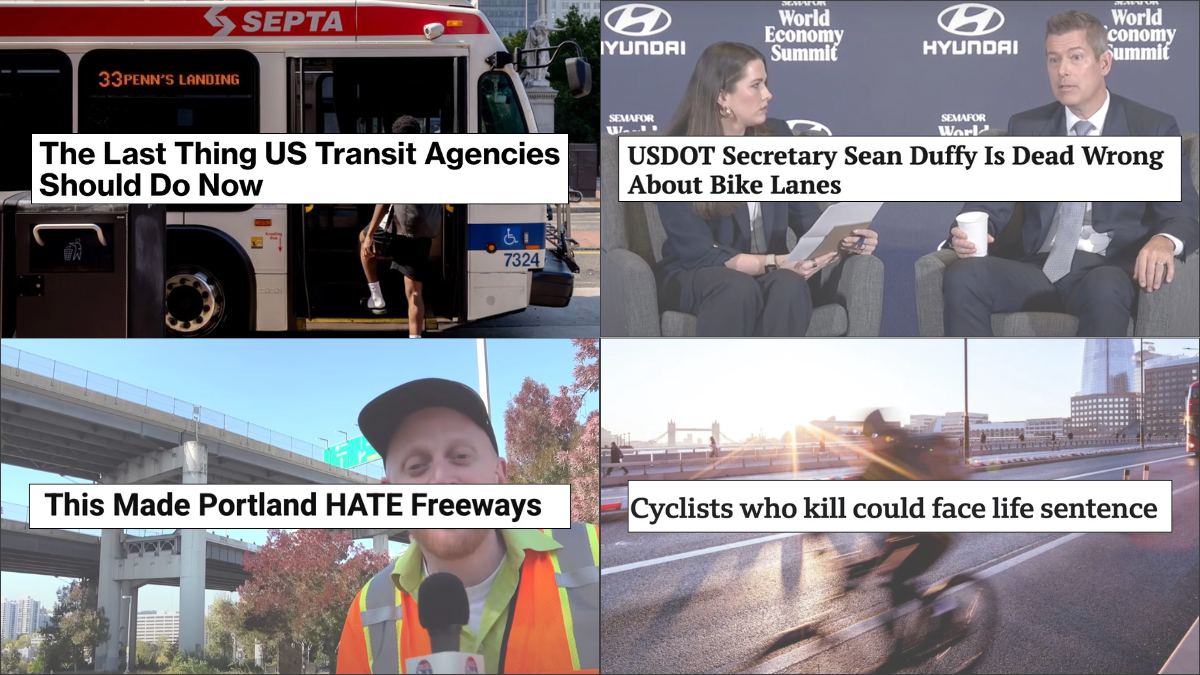
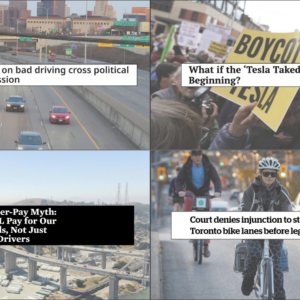
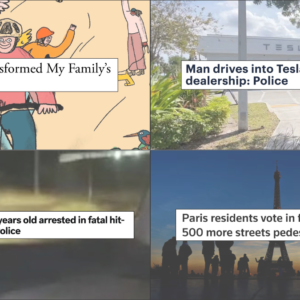
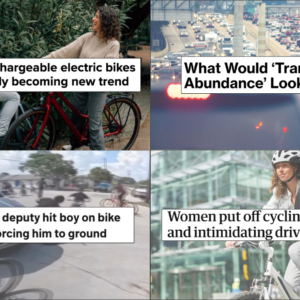
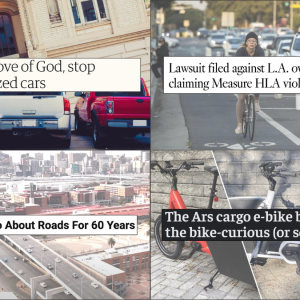
Thanks for reading.
BikePortland has served this community with independent community journalism since 2005. We rely on subscriptions from readers like you to survive. Your financial support is vital in keeping this valuable resource alive and well.
Please subscribe today to strengthen and expand our work.
On transit:
It will be the latter option. The protective shadow of growth is gone (2025 is possibly the fourth year in a row of population decline), the tax fatigue is real (a family in Portland making $400k pays the same effective rate as someone in NYC making $25M) and the service hasn’t been improved with respect to cleanliness, safety or order in years (look at Japan, that is what it needs to be like).
Two decades of people who don’t know how cities run electing people who don’t know how cities are run has delivered this austere scenario. You really can’t alienate the people who pay the bills, have the greatest amount of optionality in where they live and are the greatest contributors to the growth we saw. It is difficult to believe that Oregon and Portland in particular will radically change how they approach business development, housing development, and fiscal management to effect any meaningful change here before the bottom really falls out.
Citation needed. This is extremely wrong, so wrong that it’s not worth discussing further. NYC has higher property taxes, higher sales taxes, and (I think) higher auto taxes. And it’s not even right if you are just talking income! The effective tax rate for a $400k earner in NYC is 9.88%, and it’s 9.19% in Portland.
Great, we will just have Japanese transit by not having further public investment? Or Japanese land use policy? Portland and Japan are very different, this is not a useful comparison.
So you’re saying that society works better when we just let the rich do whatever they want and cater to their needs. What a compelling argument!
Just pull up the brackets for each state, spend 30 seconds looking at local taxes, and if your conclusion is that residents of the cheapest city on the west coast should pay as much as the residents of one of the top cities in the world, well, that’s kind of the problem. There is very very little keeping a $400k family in Portland, there are many other places that have similar quality of life, which may be why multnomah county is looking down the barrel at another $1B in income moving out in the last year.
You’re right, Japan is a terrible comparison, that’s the point! So is Amsterdam and Utrecht, and any other place with a high trust society. We don’t have that anymore. Its like putting new windows in a house with a crumbling foundation.
No, don’t do anything to make life nice for the taxpayers your entire society depends upon, that would be crazy. They should feel ashamed for their success, they should pay for their privilege in life, keep the beatings going until moral improves.
You said:
That’s either completely wrong (see above) or purposefully misleading depending on what you mean by effective rate. A family in Portland pays the same effective rate* if they make $400k or $25M. Likewise, a family in NYC earning $400k pays a similar rate to one making $25M. There are no income tax brackets that extend up that high.
*if you want to be techincal, I suppose as income increases, the relative burden to “fixed rate” taxes (property, auto, etc.) falls. It’s difficult to say exactly what a burden may be between families especially as it relates to property taxes, and this is made much more difficult by the arbitrary nature of Oregon property taxes.
If you want to have a discussion about relative value of tax burdens in Portland vs. NYC that’s fine, but we should start with an overall tax burden and work backwards from there. From what I can tell, Portland has a slightly higher tax burden for families earning $250k/more than NYC (12.6% to 12.1% in 2022 [page 24]). Does that matter? I feel like it doesn’t, but that’s just my opinion. People aren’t really choosing between Portland and NYC in a vacuum (plus, it’s a small difference). The fact that NYC has a lower tax burden for high earners than Newark probably does – since people reasonably make the choice between those places (though surely tax burden is only a small part of that decision).
This is highly debatable and entirely subjective. I earn nothing close to $400k, but there are tons of things you can get in Portland that you can’t reasonably get in other parts of the metro area. I like going to see wacky films in a theater, and I like shopping at a co-op. Is there a place that is more convenient to live in the Portland metro area than within a mile of the Clinton Street Theater? No. For people only worried about the bottom line, I suppose you can get cheaper property and lower taxes in Battle Ground, but I don’t think that’s the only way people make decisions. Schools are probably a larger factor than anything else, but as someone who doesn’t have kids I can’t pretend to know the ins and outs of that choice. Niche rates PPS as #10 in the area, below Beaverton and Tigard but above Vancouver and Hillsboro. That’s not incredible, but hardly a huge blemish.
I can tell we view the role of the wealthy in society in categorically different ways. For what it’s worth, I think it’s no mistake that the period in American history that most people view as strongly positive for middle income earners (1940s to 1970s) corresponds to a time with much higher taxes on high income earners, and a less pro-shareholder dogma in executive suites. To the extent that income inequality drives the erosion of society is debatable, but I think it’s a big factor in the issues we face. I’d rather live in a society where the wealthy pay back into the system that was at least partially responsible for that wealth than one where they take their riches and build walls to keep everyone else out. I think progressive taxation policy is part of that, and I’m happy to live in a place that agrees (mostly anyways).
Comparing Portland taxes unfavorably to NYC? Compared to what we get for our money? Yes, for those who can live anywhere, I’d say it very likely does matter. But don’t take my word for it: we can see by the comparative numbers of higher earners entering and leaving Portland whether it matters. I don’t actually know what those numbers are, but they will answer the “does it matter” question.
Regarding schools, 10th best in a group that is among the worst in the country is nothing to brag about.
Taxing the most mobile in society is best done at a national level, or even a state level. Doing it at the city level can be counter-productive.
I mean it’s just to show that interregional mobility on schools is probably not a huge factor for living in Portland vs the burbs (with a probably exception for Lake O if you can afford it).
High earners leaving Oregon to Washington is a tale as old as time around here to be fair. How much the Metro and Multnomah County taxes affected that is interesting, and probably does factor into interregional mobility, especially folks moving from Portland (where both taxes apply) to Clark Co (where none do). I think in other parts of the metro, the effect is smaller (since one tax still applies in Wash Co/Clack Co, and there’s no income tax arbitrage).
I think this is true to an extent, but is highly dependent on specifics in the region. NYC taxes income higher than adjacent parts of the NYC metro, but isn’t exactly hurting for the well-to-do. The broader point being is that people consider far more than just accounting when deciding where to live, and acting like a tax targeting the wealthy is a necessarily a drain on a local area is misguided. Should you be careful? Yes. But you should still try.
I think comparing tax burdens between Portland and NYC and imagining that lower taxes would somehow attract people from NYC is a bit ridiculous. Tax burden plays some role in where people choose to live within a metro area, it’s not a determining factor for a move across the country (for most people).
I agree, and I don’t imagine this to be true. What I was trying to say was that NYC offers very compelling reasons to stay, despite high taxes, that Portland simply doesn’t. NYC is a major world capital (despite not being a capital) on par with Tokyo, Paris, and London, whereas Portland is a small regional center, comparable to hundreds of not particularly notable cities.
So saying that our taxes are only a little higher than NYC’s doesn’t get you anywhere that I want to go.
But what are the people with money actually doing? Do they agree with me?
WW opens a January article with the line “High taxes are hurting job growth in Portland and chasing wealthy people out of town,” citing the Portland Central City Task Force convened by Gov. Tina Kotek in 2023 to rehabilitate Portland in the wake of the pandemic.
Evidently at least some do.
https://www.wweek.com/news/city/2025/01/16/high-taxes-are-hurting-portland-job-growth-and-prodding-wealthy-people-to-leave-report-says/
I agree that NYC has more of a pull than Portland, though I still prefer Portland 🙂
You’ll forgive me for taking the recommendations of that task force with a grain of salt. Asking Portland’s elite what they think is just not very enticing to me. Portland’s downtown used to have more reasons to go their than just office buildings, but landowners could maximize their return on that, and so it’s struggled to recover in an economic environment that is less downtown centric. Evidently, I think that remote work plays a huge role in the loss of population from Portland. It’s easier to justify a longer commute when you don’t have to do it every day
Downtown still has its draws… Go for the meth, stay for the fent.
It’s hard to overestimate the degree to which the visible disaster that is downtown keeps people away. I’ll only reluctantly park my bike there now, which means I go there much less often than I used to.
And heaven forbid developers build what’s most in demand at the time of construction.
I mean the pandemic is a clear example of why this isn’t always a good idea. Balancing and diversifying downtown in the 2000s and 2010s would have led to a more resilient downtown with more going on, and would have made recovery more straightforward. Good policy should be balancing the reckless profit seeking of the private market with public needs.
It’s a bummer that planners, developers, and the property market itself didn’t anticipate the pandemic, but I can understand how some folks might not have foreseen the unforeseeable.
20 years ago, everyone was panicked about the lack of commercial property. Today, it’s housing. That won’t last forever, and when the boomers are all gone leaving us with a huge housing surplus and lots of purely residential buildings that should have been mixed use with commercial on the ground floor, two future versions of us will be debating why the city didn’t anticipate the housing glut and plan accordingly.
https://www.oregonlegislature.gov/lro/Documents/Final%20Basic%20Facts%202024.pdf
You already do. The top 20% in OR pay 70% of all income tax revenues, the top 1% pay 24%. The bottom 20% paid on average $146 in income taxes, the second 20% paid on average $1,219. The middle 20% paid on average $2,624. The fourth 20% paid on average $4,807. The next 15% paid on average $10,266. The next 4% paid on average $27,128. The top 1% paid on average $141,354. Graph it out, it is parabolic.
Look at the corporate taxes, same thing, Oregon is totally exposed to large corporations willingness to pay the taxes here.
Add in property taxes and it is not even close, people who have recently built homes heavily subsidize those who do not.
https://taxfoundation.org/data/all/federal/latest-federal-income-tax-data-2024/
Federal data at the link above, pretty similar story. See table titled “The Top 1% Share of Income Taxes has Increased Over Time”. The top 1% pays 46% of all income taxes now vs 20 years ago at 33%, the bottom 50% pays 3.3% now vs 5% 20 years ago. In 1980 the top 25% paid 73% of income taxes, now they pay 89%
1). Correlation is not Causation.
2.) https://fred.stlouisfed.org/series/FYFRGDA188S
Show on the graph where the higher tax rates corresponded to higher taxes as a percentage of GDP.
LOL, sure, if you’re just thankful a bus comes and takes your kids to a building for 6 hours and then brings them back. If you’re actually interested in academic rigor, outcomes, and standards, it is the reason to move.
Right, which is why I support progressive income taxes. It’s good for society to redistribute wealth. It’s obvious that people who earn more money pay more to an income tax, and a progressive rate structure ensure that they also pay a higher rate. All good things!
Notably, I am talking about taxes are distributed through the income strata, not how much the government brings in relative to GDP. That graph says nothing about how the tax burden is distributed across society as a whole. Why would taxes as a percentage of GDP be a useful measure on that?
Evidently, if you consult historical tax income tax brackets over time, there are massive cuts to the highest tax bracket in 1980 and 1984. In the post war Keynesian era, the top marginal rate was between 75% and 90%. Cuts in the Regan years necessitated that revenue to made up somewhere, and for cuts to occur to tons of social programs. That was all very bad, but it was especially bad for less wealthy folks who both had programs they relied on cut, and had to take on larger tax burdens as a result.
Compare Portland to Vancouver – Portland has higher taxes and better ranked schools. Sure, the very wealthy can and do move to Lake O, but I’d hardly be convinced that has appreciably changed since the introduction of the Multnomah County Preschool for All Tax. Rich school districts have more resources, even if Oregon has historically attempted to alleviate that by decoupling resources from local property tax bills.
The broader point is that there are a lot of factors that people consider when choosing a place to live. Tax burden can play a role, but social ties and culture do as well. I have a lot of friends in Portland, and my lifestyle depends on my ability to get around on my bike and the bus. I presume that rich people also have social ties, and often choose to stay in Portland. I hardly see evidence of fire sales on homes in Irvington, Laurelhurst, Eastmoreland, or the West Hills.
You’re right, it’s all good, nobody is leaving, schools are fine, who cares, the film noir theater has booch on tap.
I mean if you don’t want to consider that people are multifaceted and that not everyone just narrows in on the bottom line for every decision, we weren’t going to get anywhere.
We can improve schools without resorting to outlandish rhetoric that isn’t even based in the facts on the ground. Yes, PPS has issues but they aren’t intractable and the district is clearly ranked in the middle of the road in the region. Things could be better, but they aren’t a five alarm fire.
Same with tax policy, there’s plenty of reason to be concerned about some of the ramifications of Portland’s current tax structure and an over-reliance on bespoke ballot measures rather than more standard funding streams that other more sane regions use. But to imagine that everyone is packing their bags to leave over two income tax measures (one of which applies region-wide within Oregon) is a gross oversimplification and misses important nuance why the taxes were necessary in the first place. Part of that story is the federal government abandoning Great Society policy and a declining social safety net leading to people having no option but the streets. Portland cannot stop the bleeding on its own, but I think it’s still right to try.
TriMet finally has a morning presence on the Max trains and platforms which helps with the perception of being a secure place.
But the elephant in the room, they still refuse to enforce rules that only let people on that actually pay a fare (buses and trains). Until that happens ridership will still be low.
And how much you want to make a bet if push comes to shove, those “security” people that I’ve been seeing more of will be slashed.
RE BBC:
Not exactly… The rules would bring cycling offences in line with driving offences. Behavior resulting in serious injury or death could incur up to 5 years in jail, and lesser offences up to 2 years.
“I would have found it pretty cool to have a freeway to zip across east Portland. But the 4000 people that were living in the project’s path found it pretty UN-cool.”
What a bunch of NIMBYs!
Hey, wasn’t sure where to post this;
There was a Lower Albina planning session that got mentioned a few days ago in one of the Bike Portland articles, and, while I couldn’t attend in person, I attended online. It was really cool, and when it was time for public comment, I said that I advocated for a bicycle infrastructure and public transit focus
So thanks for letting us know that that was going on.
Cheers
R